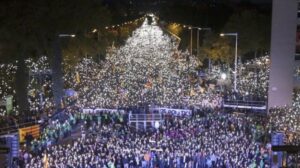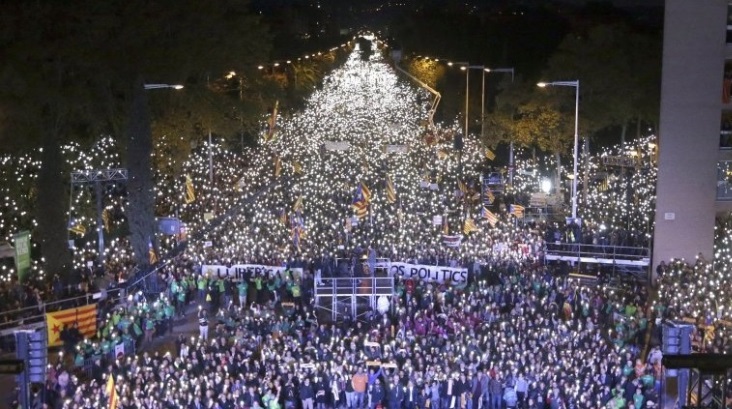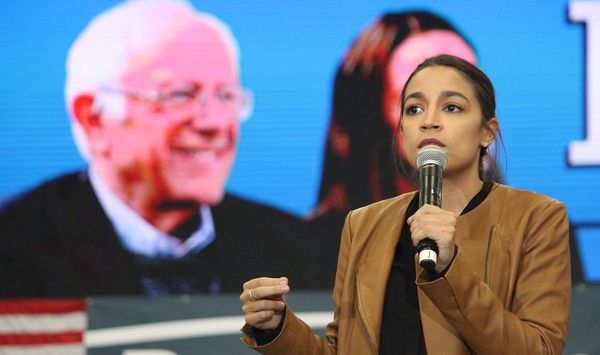 Struggle until victory, for a workers’ Republic of Catalonia
Struggle until victory, for a workers’ Republic of Catalonia
On Saturday 11 November, a massive mobilisation or over 1 million people lined over 3.3 kilometres of Marina avenue in Barcelona, demanding the freedom of political prisoners. This show of strength is a qualitative change in the struggle against repression and the PP government.
The masses want to struggle to the end
Millions of people have understood that the application of article 155 and the suppression of autonomy for Catalonia, the jailing of the ‘Jordis’, and 8 Ministers of the Catalan government, are an unprecedented attack on democratic rights. Tomorrow, the same excuses will be used by the PP, Ciudadanos and PSOE to justify jailing any trade union, youth or neighbourhood activist, or members of Left organisations who question the reactionary regime of 1978 and its Constitution.
As on other occasions during the last months, the whip of counter-revolution from the Spanish nationalist reaction, has pushed millions to again take to the streets with the same determination as on 1 October, when millions defended their right to decide against savage police repression, and on 3 October when Catalonia was paralysed with a general strike. The mass march on 11 November took place only days after another great day of action. On 8 November, despite the campaign of defamation in the media, and the opposition of the main trade union leaders (CCOO and UGT), hundreds of thousands took the streets for a general strike. Workplaces were paralysed, roads and train lines were blocked and countless demonstrations took place.
Venezuela and Russia
It is difficult to find such a sustained, massive and powerful period of mobilisation in history, and its consequences are being felt by the forces of reaction. The campaign of lies and manipulation against the Catalan people seems to be endless, and more and more grotesque, showing the authoritarian face of the regime.
Now the government, with the help of Ciudadanos and PSOE say that the Catalan crisis has been provoked by Maduro and Putin, who have “saturated” social media with “disinformation” about Catalonia. The front pages of newspapers like El Pais and others contain supposed proof, that the mass mobilisations in Catalonia are the result of “foreign intervention”. It is impossible not to compare this with the delirious propaganda campaigns of Franco, who spoke of a “Jewish Masonic plot”, financed by Russia, being behind social revolts and strikes against the dictatorship.
This campaign, blaming the “external enemy” for the sharpest political crisis since the dictatorship, is evidence of desperation. They are already talking about the possibility of Russian and Venezuelan interference in the Catalan elections on 21 December, which they will use to question the results if the results are not favourable to them.
Discontent and a search for alternatives among the ranks of the Left
On 1 and 3 October, after the masses defeated repression through mass action, a revolutionary crisis was opened in Catalonia. The Spanish capitalists understood this better than the leaders of the reformist Left. This is why they have applied such unprecedented repression. They want to end the revolutionary crisis by crushing the mass movement and erasing the idea of “sí se puede” (yes we can) from the mind of the masses.
These events are putting all forces to the test, provoking sharp debates and even splits. Pedro Sanchez’s PSOE and the bureaucratic leaders of the CCOO and UGT unions have been dragged behind Rajoy supporting article 155. Scorning the mass movement of the Catalan people against oppression and for the Republic, they have separated themselves even further from the advanced layers of the working class and vast majority of the youth and impoverished middle layers. Their conservatism and their material interests push them to fuse themselves with the state and ruling class, convinced that their destiny is linked to the stability of the system.
At the same time, forces which claim to be Republican and radical, like Podemos and IU, instead of defending the legitimacy of the referendum on 1 October and explain clearly to the working class of the rest of the Spanish state what is at stake, and organise the struggle in the streets, they have taken the road of “equidistance”. They merely call on the repressive state and politicians to call a “legal” referendum with “guarantees”. They are losing a great opportunity to link the defence of the Catalan Republic with the struggle to bring down the PP, end austerity and open the way for a workers’ Republic in the rest of the Spanish state. These leaders have refused to effectively answer the campaign of Spanish nationalism.
Of course there are many differences between them. Alberto Garzon, leader of IU is the one who has gone the furthest. He denies that the leaders of the mass movement and the Ministers of the Catalan government who have been jailed are “political prisoners”, even saying that “they knew what they were doing” and that they shouldn’t complain too much. This is not a dignified position for someone who claims to be Marxist or Communist. The first task of any revolutionary, as Che Guevara said, is to fight all injustice and attacks on democratic rights, wherever it happens. To present, as Garzon does, the mass movement in Catalonia as a movement of the elite is to falsify reality. The leaders of PDeCAT and the Catalan bourgeoisie have been totally swept along by the movement. Hundreds of thousands of people see the Catalan Republic as a way of breaking with the regime of 1978, ending austerity and advancing towards both social and national liberation.
To say, as Garzon does, that the Catalan Republic goes against the interests of the working class and that “communists” cannot support it, is blatant manipulation and falsification of Marxism. Marxism has always defended the right of nations to self-determination – a struggle against any attempt to keep any nation within borders against its will, preventing it from the right to independence. Garzon’s ideas are being used by the ruling class to promote confusion and Spanish nationalist prejudices inside and outside Catalonia.
Pablo Iglesias has rejected the government’s repressive measures much more clearly than Garzon and denounced the existence of political prisoners. But this is not enough, if at the same time, he renounces the duty to mobilise on the streets against repression, and explain the revolutionary meaning of this movement. Moreover, Iglesias has even said that the results of the 1 October referendum are “illegitimate”. What could be more legitimate than a vote cast under threat of rubber bullets and batons, in which over 2.2 million people participated, more than in the last European elections?
These positions prioritise “respect for the rule of law” – a law inherited from Francoism and designed to maintain capitalist order – over the democratic will of the people. It is a betrayal of one of the central ideas which has allowed Podemos to grow so much in the last years at the expense of PSOE. Podemos presented itself to people as the force that would end the regime of 1978, end austerity and mass unemployment and policies that only benefit the big banks and monopolies.
This contradiction between the rhetoric and practice of Podemos is what has led to the splitting of Podemos in Catalonia and the resignation of the leader of Podemos in Catalonia, Albano Dante Fachin, who had maintained a position much more true to the original principles of Podemos. Albano Dante, while identifying himself as an internationalist, correctly defended that the members of Podemos should be in the front line of the struggle for the referendum, and then for the implementation of the result of the referendum – the Catalan Republic – against state repression. This made Dante one of the most popular leaders of the mobilisations in Catalonia.
Disowning and undermining Albano Dante, the Spanish leadership of Podemos pressured him to resign and leave the party. This harassment of Dante contrasts with the indulgence shown to other leaders of Podemos who have promoted Spanish nationalist prejudices like Bescansa, or the leader of Iniciativa (Catalan Party which is part of the Unidos Podemos coalition), Joan Coscubiela.
If the Spanish leadership of Podemos had the same position as Albano Dante, it would have been much easier for Podemos to link the mass movement for a Catalan Republic with the sections of the working class in Catalonia and outside, who are against the PP but do not trust the movement for independence because of the role of Puigdemont and the bourgeois nationalists of PDeCAT. This is the central task of the moment: take the leadership of the movement from the hands of these politicians and link it to the struggle to transform society and end the oppression of the Spanish and Catalan oligarchy.
Among the members of the “Comunes” (municipal Left alliances established by Podemos and other forces. Led by Barcelona Mayor, Ada Colau in Catalonia) and among thousands of its voters, there is discontent with the position put forward by the majority of its leaders. The changes in position by Ada Colau have been widely criticised. This was reflected in the decision by the rank and file of ‘Barcelona en Comun’ to break the coalition deal in Barcelona town hall with PSC (Catalan PSOE) in protest at its support for repression. In various polls, more than one third of “Comun” voters support the independence of Catalonia.
Continue the struggle until victory
After the power displayed on 8 and 11 November, the organisations of the fighting Left and the Committees in Defence of the Republic (CDR) which have built their strength in the last weeks, draw up a plan of action for sustained mobilisation until victory. This is also the best way to defeat the Spanish nationalist reaction in the elections on 21 December.
It would be a bad mistake to see street mobilisation as merely a secondary tactic to electoralism. It is exactly the opposite: we can only defeat reaction and make the will of the people reality by using the methods which have got us this far. Every time there has been a serious call to action the masses have surpassed all expectations. Every time the streets have been abandoned, the leaders of the right wing of the movement, led by PDeCAT, have tried to retreat, emboldening the reaction.
There are many examples. The defence strategy pursued by Carme Forcadell and the other members of the Catalan parliamentary committee in court; saying that the declaration of the Republic was only “symbolic” and promising to “remain within the framework of the constitution” is a mistake. The Supreme Court (which granted them bail) acted differently with them, not because of this strategy but because of their fear of the mass movement. Hundreds of thousands of people, especially from the sections of the working class that mobilised on 1 and 3 October but who did not participate in the movement since, came back onto the streets on 8 and 11 November. The most clear headed representatives of the ruling class fear that the rejection of repression, added to the discrediting of the Spanish regime and monarchy in general, could create the conditions for the Catalan working class to decisively support the Catalan Republic.
We will not defeat the savage campaign of fear, or the attempts to divide the Catalan working class via the poison of Spanish nationalism, by retreating. Accepting the “framework of the constitution” and characterising the Republic as only “symbolic” are mistakes that will be used by the Spanish ruling class to sow doubts and confusion.
We will not win via rhetoric or legal tricks. This is the method of the bourgeois nationalists in Catalonia, who retreat at every moment to betray the aspirations of the movement. The only way to defeat the anti-democratic regime of 1978 is fighting to make the Catalan Republic a reality and give it a social content, against the policies of austerity which both the PP and PDeCAT have implemented, ending cuts and evictions, guaranteeing public health and education, jobs with decent salaries and the nationalisation of the banks under democratic control. Only the fight for a Socialist Catalan Republic to end class oppression and guarantee resources to satisfy the needs of the majority, can unite the workers’ movement in Catalonia and beyond. This would also win the sympathy of millions of workers throughout Europe, weakening the repressive capability of the Spanish state.
For a united front of the fighting Left! For a workers’ Republic of Catalonia
The depth of the revolutionary crisis underway in Catalonia, and the impressive reserves of energy and live in the movement which has been shown in the last few days, is starting to be reflected in all organisations, provoking big changes. ERC, under the pressure of its base, has refused to repeat their electoral coalition with the PDeCAT. There has also been news of widespread discontent in the rank and file of the ANC (National Catalan Assembly, mass pro-independence organisation) at the weakness of the response to state repression. On 12 November, 54% of the members of Catalunya en Comu voted to end their collaboration with the PSC in Barcelona town hall. Albano Dante, together with a significant sector of ex-leaders and members of Podemos, established Som Alternativa (We are the alternative), which is discussing running in the elections together with other parties, such as the CUP and ERC.
On the same day, the members of the CUP decided in their national congress to make a 180 degree turn against the tactic of support for PDeCAT which its leadership has pursued. This tactic has been a complete mistake, and has allowed PDeCAT to remain in the leadership of the process, betraying it on various occasions and preventing social demands from being incorporated – in order to decisively win over the Catalan working class.
Esquerra Revolucionaria (CWI in Catalonia) call on the CUP, Podem, Catalunya en Comú, and Som Alternativa to form a united front if the fighting Left to fight against the regime of 1978. Based on the organisation and extension of the CDR committees we must build a generalised, sustained, and powerful movement in the streets to defeat Spanish nationalist reaction and win a workers’ Republic of Catalonia.
- Join Esquerra Revolucionària to fight for a Socialist Republic of Catalonia
- Down with article 155! Freedom for all political prisoners! Withdraw the Spanish national and military police from Catalonia
- Repeal all reactionary labour reforms and pension reforms! Retirement at 60 with 100% salary and equal conditions for young workers!
- A minimum wage of €1,100 and a 35-hour working week with no loss of pay
- Ban evictions! Expropriate empty homes held by the banks to create social housing!
- Re-nationalise all privatised public services, maintaining and increasing the workforce and respecting workers’ rights.
- Repeal the reactionary education laws! Public, quality, free and universal education from infancy to university!
- For the right to public, free and universal healthcare!
- Solidarity with refugees! Repeal the racist migration laws and close down the prison camps for migrants!
- For democratic rights to speech, meetings and organisation! Repeal the repressive laws!
Nationalise the banks and strategic industries to bail out working class people and guarantee decent living standards. - For the right of self-determination in Catalonia, the Basque Country and Galicia. For a Socialist Republic of Catalonia, and a Federal Socialist Republic based on the free and voluntary union of the peoples of the Spanish state, if that is their democratic wish.



